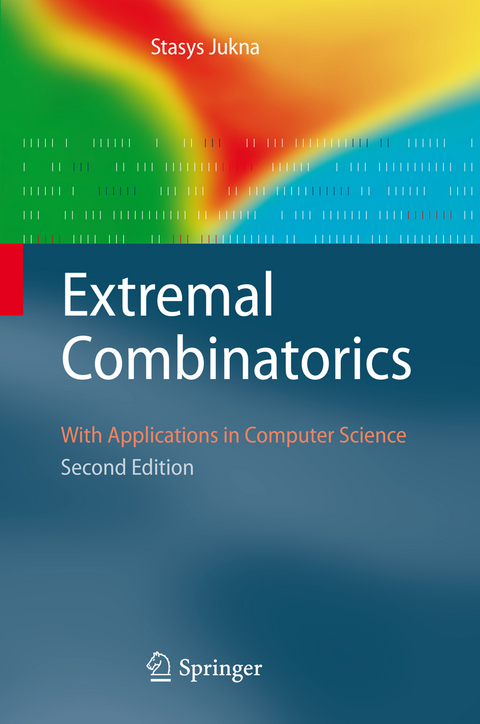
Extremal Combinatorics
Springer Berlin (Verlag)
978-3-642-26990-5 (ISBN)
This book is a concise, self-contained, up-to-date introduction to extremal combinatorics for nonspecialists. There is a strong emphasis on theorems with particularly elegant and informative proofs, they may be called gems of the theory. The author presents a wide spectrum of the most powerful combinatorial tools together with impressive applications in computer science: methods of extremal set theory, the linear algebra method, the probabilistic method, and fragments of Ramsey theory. No special knowledge in combinatorics or computer science is assumed - the text is self-contained and the proofs can be enjoyed by undergraduate students in mathematics and computer science. Over 300 exercises of varying difficulty, and hints to their solution, complete the text.
This second edition has been extended with substantial new material, and has been revised and updated throughout. It offers three new chapters on expander graphs and eigenvalues, the polynomial method and error-correcting codes. Most of the remaining chapters also include new material, such as the Kruskal-Katona theorem on shadows, the Lovász-Stein theorem on coverings, large cliques in dense graphs without induced 4-cycles, a new lower bounds argument for monotone formulas, Dvir's solution of the finite field Kakeya conjecture, Moser's algorithmic version of the Lovász Local Lemma, Schöning's algorithm for 3-SAT, the Szemerédi-Trotter theorem on the number of point-line incidences, surprising applications of expander graphs in extremal number theory, and some other new results.
The author is a professor at the Goethe Universität Frankfurt and he is also a member of the Vilnius University Institute of Mathematics and Informatics. His main fields of research are theoretical computer science and discrete mathematics, in particular complexity.
Preface.- Prolog: What this Book Is About.- Notation.- Counting.- Advanced Counting.- Probabilistic Counting.- The Pigeonhole Principle.- Systems of Distinct Representatives.- Sunflowers.- Intersecting Families.- Chains and Antichains.- Blocking Sets and the Duality.- Density and Universality.- Witness Sets and Isolation.- Designs.- The Basic Method.- Orthogonality and Rank Arguments.- Eigenvalues and Graph Expansion.- The Polynomial Method.- Combinatorics of Codes.- Linearity of Expectation.- The Lovász Sieve.- The Deletion Method.- The Second Moment Method.- The Entropy Function.- Random Walks.- Derandomization.- Ramseyan Theorems for Numbers.- The Hales-Jewett Theorem.- Applications in Communications Complexity.- References.- Index.
From the reviews of the second edition:
"This is an entertaining and impressive book. I say impressive because the author managed to cover a very large part of combinatorics in 27 short chapters, without assuming any graduate-level knowledge of the material. ... The collection of topics covered is another big advantage of the book. ... The book is ideal as reference material or for a reading course for a dedicated graduate student. One could teach a very enjoyable class from it as well ... ." (Miklós Bóna, The Mathematical Association of America, May, 2012)
"[R]eaders interested in any branch of combinatorics will find this book compelling. ... This book is very suitable for advanced undergraduate and graduate mathematics and computer science majors. It requires a very solid grounding in intermediate-level combinatorics and an appreciation for several proof methods, but it is well worth the study." (G.M. White, ACM Computing Reviews, May 2012)
"This is the second edition of a well-received textbook. It has been extended with new and updated results. Typographical errors in the first edition are corrected. ... This textbook is suitable for advanced undergraduate or graduate students as well as researchers working in discrete mathematics or theoretical computer science. The author's enthusiasm for the subject is evident and his writing is clear and smooth. This is a book deserving recommendation." (Ko-Wei Lih, Zentralblatt MATH, Vol. 1239, 2012)
"This is an introductory book that deals with the subject of extremal combinatorics. ... The book is nicely written and the author has included many elegant and beautiful proofs. The book contains many interesting exercises that will stimulate the motivated reader to get a better understanding of this area. ... author's goal of writing a self-contained book that is more or less up to date ... and that is accessible to graduate and motivated undergraduate students inmathematics and computer science, has been successfully achieved." (Sebastian M. Cioaba, Mathematical Reviews, January, 2013)
| Erscheint lt. Verlag | 27.11.2013 |
|---|---|
| Reihe/Serie | Texts in Theoretical Computer Science. An EATCS Series |
| Zusatzinfo | XXIV, 412 p. |
| Verlagsort | Berlin |
| Sprache | englisch |
| Maße | 155 x 235 mm |
| Gewicht | 510 g |
| Themenwelt | Mathematik / Informatik ► Informatik ► Theorie / Studium |
| Mathematik / Informatik ► Mathematik ► Algebra | |
| Mathematik / Informatik ► Mathematik ► Angewandte Mathematik | |
| Mathematik / Informatik ► Mathematik ► Arithmetik / Zahlentheorie | |
| Mathematik / Informatik ► Mathematik ► Graphentheorie | |
| Mathematik / Informatik ► Mathematik ► Logik / Mengenlehre | |
| Schlagworte | combinatorics • Discrete Probability • Error-correcting codes • extremal combinatorics • extremal set theory • linear algebra • Linear Algebra Method • Polynomial Method • Probabilistic method • Ramsey theory |
| ISBN-10 | 3-642-26990-7 / 3642269907 |
| ISBN-13 | 978-3-642-26990-5 / 9783642269905 |
| Zustand | Neuware |
| Haben Sie eine Frage zum Produkt? |
aus dem Bereich


